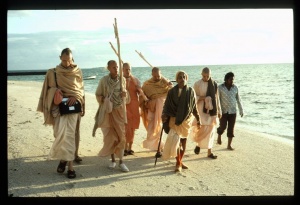SB 5.26.32: Difference between revisions
m (1 revision(s)) |
(Vanibot #0018 edit: make synonym terms in Sanskrit italic in SB - Vanisource) |
||
| Line 1: | Line 1: | ||
{{info | {{info | ||
|speaker= | |speaker=Śukadeva Gosvāmī | ||
|listener=King | |listener=King Parīkṣit | ||
}} | }} | ||
[[Category:Srimad-Bhagavatam - Canto 05 Chapter 26]] | |||
[[Category:Bhagavatam Verses Spoken by Sukadeva Gosvami - Vanisource|052632]] | |||
<div style="float:left">'''[[Srimad-Bhagavatam]] - [[SB 5|Fifth Canto]] - [[SB 5.26: A Description of the Hellish Planets|Chapter 26: A Description of the Hellish Planets]]'''</div> | |||
<div style="float:right">[[File:Go-previous.png|link=SB 5.26.31]] '''[[SB 5.26.31]] - [[SB 5.26.33]]''' [[File:Go-next.png|link=SB 5.26.33]]</div> | |||
{{RandomImage}} | |||
==== TEXT 32 ==== | ==== TEXT 32 ==== | ||
<div | <div class="verse"> | ||
ye tv iha vā anāgaso 'raṇye grāme vā vaiśrambhakair upasṛtān upaviśrambhayya jijīviṣūn śūla-sūtrādiṣūpaprotān krīḍanakatayā yātayanti te 'pi ca pretya yama-yātanāsu śūlādiṣu protātmānaḥ kṣut-tṛḍbhyāṁ cābhihatāḥ kaṅka-vaṭādibhiś cetas tatas tigma-tuṇḍair āhanyamānā ātma-śamalaṁ smaranti | :ye tv iha vā anāgaso 'raṇye grāme vā vaiśrambhakair | ||
:upasṛtān upaviśrambhayya jijīviṣūn śūla-sūtrādiṣūpaprotān | |||
:krīḍanakatayā yātayanti te 'pi ca pretya yama-yātanāsu | |||
:śūlādiṣu protātmānaḥ kṣut-tṛḍbhyāṁ cābhihatāḥ | |||
:kaṅka-vaṭādibhiś cetas tatas tigma-tuṇḍair | |||
:āhanyamānā ātma-śamalaṁ smaranti | |||
</div> | </div> | ||
| Line 13: | Line 24: | ||
==== SYNONYMS ==== | ==== SYNONYMS ==== | ||
<div | <div class="synonyms"> | ||
''ye''—persons who; ''tu''—but; ''iha''—in this life; ''vā''—or; ''anāgasaḥ''—who are faultless; ''araṇye''—in the forest; ''grāme''—in the village; ''vā''—or; ''vaiśrambhakaiḥ''—by means of good faith; ''upasṛtān''—brought near; ''upaviśrambhayya''—inspiring with confidence; ''jijīviṣūn''—who want to be protected; ''śūla-sūtra-ādiṣu''—on a lance, thread, and so on; ''upaprotān''—fixed; ''krīḍanakatayā''—like a plaything; ''yātayanti''—cause pain; ''te''—those persons; ''api''—certainly; ''ca''—and; ''pretya''—after dying; ''yama-yātanāsu''—the persecutions of Yamarāja; ''śūla-ādiṣu''—on lances and so on; ''prota-ātmānaḥ''—whose bodies are fixed; ''kṣut-tṛḍbhyām''—by hunger and thirst; ''ca''—also; ''abhihatāḥ''—overwhelmed; ''kaṅka-vaṭa-ādibhiḥ''—by birds such as herons and vultures; ''ca''—and; ''itaḥ tataḥ''—here and there; ''tigma-tuṇḍaiḥ''—having pointed beaks; ''āhanyamānāḥ''—being tortured; ''ātma-śamalam''—own sinful activities; ''smaranti''—they remember. | |||
</div> | </div> | ||
| Line 20: | Line 31: | ||
==== TRANSLATION ==== | ==== TRANSLATION ==== | ||
<div | <div class="translation"> | ||
In this life some people give shelter to animals and birds that come to them for protection in the village or forest, and after making them believe that they will be protected, such people pierce them with lances or threads and play with them like toys, giving them great pain. After death such people are brought by the assistants of Yamarāja to the hell known as Śūlaprota, where their bodies are pierced with sharp, needlelike lances. They suffer from hunger and thirst, and sharp-beaked birds such as vultures and herons come at them from all sides to tear at their bodies. Tortured and suffering, they can then remember the sinful activities they committed in the past. | In this life some people give shelter to animals and birds that come to them for protection in the village or forest, and after making them believe that they will be protected, such people pierce them with lances or threads and play with them like toys, giving them great pain. After death such people are brought by the assistants of Yamarāja to the hell known as Śūlaprota, where their bodies are pierced with sharp, needlelike lances. They suffer from hunger and thirst, and sharp-beaked birds such as vultures and herons come at them from all sides to tear at their bodies. Tortured and suffering, they can then remember the sinful activities they committed in the past. | ||
</div> | </div> | ||
__NOTOC__ | |||
<div style="float:right; clear:both;">[[File:Go-previous.png|link=SB 5.26.31]] '''[[SB 5.26.31]] - [[SB 5.26.33]]''' [[File:Go-next.png|link=SB 5.26.33]]</div> | |||
__NOTOC__ | |||
__NOEDITSECTION__ | |||
Revision as of 02:08, 1 December 2017

A.C. Bhaktivedanta Swami Prabhupada
TEXT 32
- ye tv iha vā anāgaso 'raṇye grāme vā vaiśrambhakair
- upasṛtān upaviśrambhayya jijīviṣūn śūla-sūtrādiṣūpaprotān
- krīḍanakatayā yātayanti te 'pi ca pretya yama-yātanāsu
- śūlādiṣu protātmānaḥ kṣut-tṛḍbhyāṁ cābhihatāḥ
- kaṅka-vaṭādibhiś cetas tatas tigma-tuṇḍair
- āhanyamānā ātma-śamalaṁ smaranti
SYNONYMS
ye—persons who; tu—but; iha—in this life; vā—or; anāgasaḥ—who are faultless; araṇye—in the forest; grāme—in the village; vā—or; vaiśrambhakaiḥ—by means of good faith; upasṛtān—brought near; upaviśrambhayya—inspiring with confidence; jijīviṣūn—who want to be protected; śūla-sūtra-ādiṣu—on a lance, thread, and so on; upaprotān—fixed; krīḍanakatayā—like a plaything; yātayanti—cause pain; te—those persons; api—certainly; ca—and; pretya—after dying; yama-yātanāsu—the persecutions of Yamarāja; śūla-ādiṣu—on lances and so on; prota-ātmānaḥ—whose bodies are fixed; kṣut-tṛḍbhyām—by hunger and thirst; ca—also; abhihatāḥ—overwhelmed; kaṅka-vaṭa-ādibhiḥ—by birds such as herons and vultures; ca—and; itaḥ tataḥ—here and there; tigma-tuṇḍaiḥ—having pointed beaks; āhanyamānāḥ—being tortured; ātma-śamalam—own sinful activities; smaranti—they remember.
TRANSLATION
In this life some people give shelter to animals and birds that come to them for protection in the village or forest, and after making them believe that they will be protected, such people pierce them with lances or threads and play with them like toys, giving them great pain. After death such people are brought by the assistants of Yamarāja to the hell known as Śūlaprota, where their bodies are pierced with sharp, needlelike lances. They suffer from hunger and thirst, and sharp-beaked birds such as vultures and herons come at them from all sides to tear at their bodies. Tortured and suffering, they can then remember the sinful activities they committed in the past.